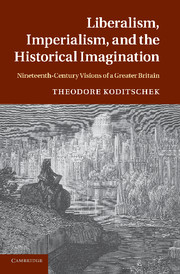 Liberalism, Imperialism, and the Historical Imagination
Liberalism, Imperialism, and the Historical Imagination Book contents
- Frontmatter
- Contents
- Acknowledgements
- List of abbreviations
- Introduction
- 1 Imagining Great Britain: Union, Empire, and the burden of history, 1800–1830
- 2 Imagining a British India: history and the reconstruction of Empire
- 3 Imagining a Greater Britain: the Macaulays and the liberal romance of Empire
- 4 Re-imagining a Greater Britain: J. A. Froude: counter-romance and controversy
- 5 Greater Britain and the “lesser breeds”: liberalism, race, and evolutionary history
- 6 Indian liberals and Greater Britain: the search for union through history
- Epilogue: From liberal imperialism to Conservative Unionism: losing the thread of progress in history
- Index
- References
Epilogue: From liberal imperialism to Conservative Unionism: losing the thread of progress in history
Published online by Cambridge University Press: 04 April 2011
- Frontmatter
- Contents
- Acknowledgements
- List of abbreviations
- Introduction
- 1 Imagining Great Britain: Union, Empire, and the burden of history, 1800–1830
- 2 Imagining a British India: history and the reconstruction of Empire
- 3 Imagining a Greater Britain: the Macaulays and the liberal romance of Empire
- 4 Re-imagining a Greater Britain: J. A. Froude: counter-romance and controversy
- 5 Greater Britain and the “lesser breeds”: liberalism, race, and evolutionary history
- 6 Indian liberals and Greater Britain: the search for union through history
- Epilogue: From liberal imperialism to Conservative Unionism: losing the thread of progress in history
- Index
- References
Summary
The sentiment of empire may be called innate in every Briton. If there are exceptions, they are like those of men blind or lame among us. It is part of our patrimony … a portion of our national stock, which has never been deficient, but which has more than once run to rank excess, and brought us to mischief … What we want from the Colonies is something better than “food for powder.” To give birth and existence to these States, which are to form so large a portion of the New World, is a noble feature of the work and mission of this nation, as it was of old in the mission of Greece [but] the prospective multiplication of possessions oversea is, to say the least, far from desirable … England, which has grown so great, may easily become little; through the effeminate selfishness of luxurious living; through neglecting realities at home to amuse herself everywhere else in stalking phantoms; through putting again on her resources a strain like that of the great French war, which brought her people to misery and her Throne to peril; through that denial of equal rights to others.
W. E. Gladstone, “England's Mission,” The Nineteenth Century, IV (1878), 560–8- Type
- Chapter
- Information
- Liberalism, Imperialism, and the Historical ImaginationNineteenth-Century Visions of a Greater Britain, pp. 314 - 345Publisher: Cambridge University PressPrint publication year: 2011
